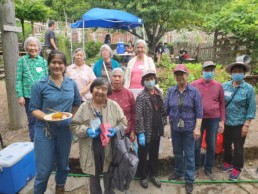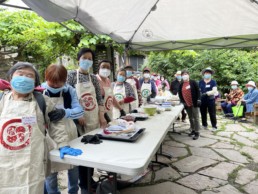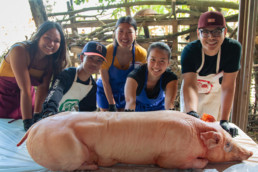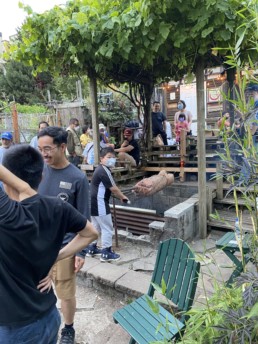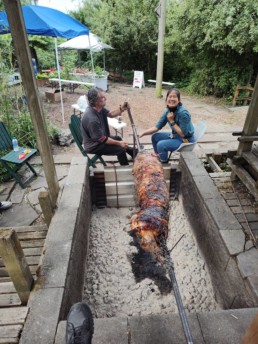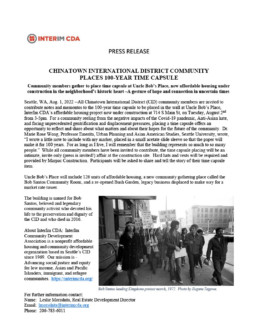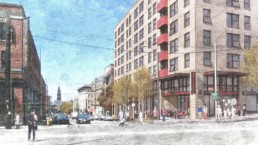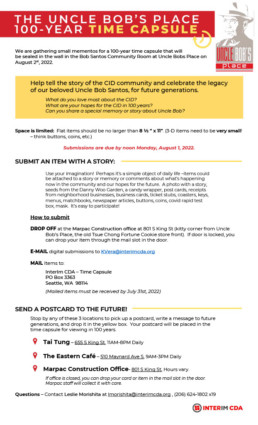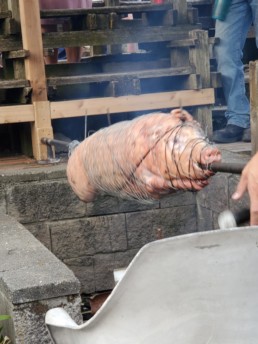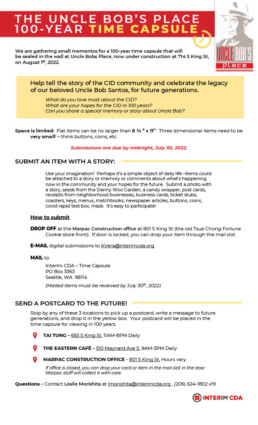InterIm CDA statement to Seattle City Council and King County Council on SODO shelter location adjacent to Chinatown-ID
September 27, 2022Events,Community,News,Neighborhood,Press
The King County Regional Homelessness Authority says it stands for racial equity and social justice, however, their planned homeless megaplex next to the CID looks like an intentional ploy to keep the poorest people of color down, to concentrate them in one small area away from whiter more affluent areas, and to pit them against each other.
Stand up for racial equity and social justice! Learn more and take action: https://www.friendsofseattlecid.com/
For InterIm CDA’s letter to the Seattle City Council: To Seattle City Council regarding the planned homeless megaplex next to the CID
For InterIm CDA’s letter to the King County Council: To King County Council regarding the planned homeless megaplex next to the CID
Photos by Eugene Tagawa.
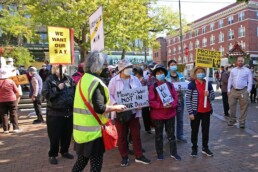
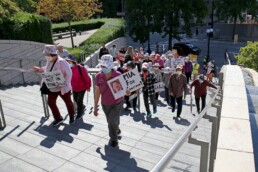
Celebrating National Voter Registration Day!
September 19, 2022Events,Community,News,Neighborhood,Press

Did you know that tomorrow is National Registration Day? National Voter Registration Day is a nonpartisan civic holiday that commemorates our democracy and was first observed in 2012. Approximately 4.7 million citizens end up registering throughout our country on this specific day.
For those that are registered to vote, this is the day where you can also update your information regarding to changes in your location, name, or even updating your own voter ballot signature. You can update your address online or by mail until 8 days before an election.
Many organizations and volunteers throughout the country have end up creating awareness for this day and we are in support of this day as well. To our Washingtonians who have not yet registered, feel free to register online, by mail, by print, or in person at your nearest county elections department. Registrations online, by print, or by mail can only be done until 8 days before an election. Be #VoteReady for #NationalVoterRegistrationDay!!
Register to vote now:
For Washingtonians: https://www.sos.wa.gov/elections/register.aspx
For non-Washingtonians: https://nationalvoterregistrationday.org/register-to-vote/
Soul Healing Festival
September 8, 2022Events,Community,News,Neighborhood,Press
InterIm CDA is partnering with The Future Ancient to host the first ever Soul Healing Festival in the Chinatown International District!
20+ cultural artists and groups share their music, song, story and dance, 2 fashion shows, and 2 live bands bless us with their creative talents and beautiful lineages (4-8pm). We also offer free acupuncture, massage, yoga and Qi Gong to the people (1-4pm). After sundown, a movie in the park A Different Mirror: Resilience and Community Building in Seattle’s Chinatown International District (CID), in the heart of the CID, Hing Hay Park!
1-10pm at Hing Hay Park 423 Maynard Ave S.
4pm live-stream at www.TheFutureAncient.org
@theFutureAncient
Here is also the facebook page for the event : https://www.facebook.com/events/1136883250540342
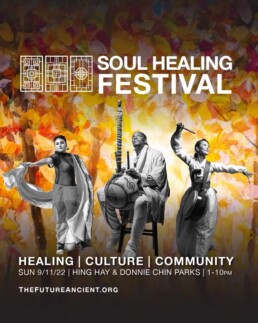
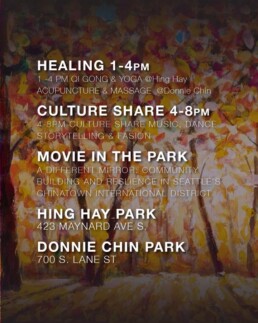
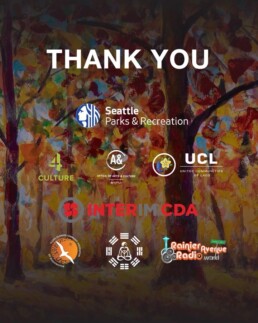
July 28, 2022Community,News,Neighborhood,Press

July 28, 2022
To: Sound Transit Board Chair Kent Keel, Sound Transit Board of Directors, Sound Transit System Expansion Committee, King County Council, Mayor Bruce Harrell, City of Seattle Councilmembers
RE: Selecting or confirming a preferred alternative for the West Seattle and Ballard Link Extensions Project
Dear Chair Keel, Sound Transit Boardmembers, King County Councilmembers, Seattle City Councilmembers, Mayor Harrell, and Executive Constantine,
InterIm CDA is a community-based nonprofit 501(C3) community development organization. We are rooted in the Chinatown-International District (CID) and provide community-based real estate development services, housing services, and programmatic services for immigrant, refugee, API, and other low-income communities. We provide comment today through a lens of equitable development—where we intend to create space for everyone to participate in and benefit from the Chinatown International District neighborhood’s growth. Our representation focuses on those most easily left behind—low income people, immigrants, refugees, and people of color.
We support the expansion of the light rail system for the region. We recognize the challenges we all face expanding high-capacity transit systems in the densely built environments of Snohomish, King, and Pierce Counties. We realize how important it is for the Sound Transit Board of Directors to identify a preferred alternative for the WSBLE project.
It is through this lens that we offer you our perspective on further developing the WSBLE project in the CID.
The community is unified in its call to reject another permanent injury to our culture and community. This neighborhood has been disproportionately harmed by past infrastructure projects, and our DEIS letter lists projects and policies in explicit detail. While our community may disagree about whether we support or oppose light rail and whether we prefer 4th or 5th Avenue, we are in complete agreement that this project must not result in yet another existential blow to the CID and people of color.
We support Sound Transit’s plan to expand light rail. InterIm seeks development outcomes that promote transportation mobility and connectivity, and we recognize that the WSBLE project is intended to add much needed capacity to the light rail system. We seek to find a just and equitable approach that improves connectedness between the CID and the Puget Sound region without displacing current residents, small culturally relevant businesses, and community organizations from the neighborhood.
All the alternatives in the DEIS for the CID Segment will result in permanent harm to the CID. The DEIS only studied direct impacts to residents and businesses resulting from project construction. It did not give any real consideration to how each alternative will impact residents, businesses, and community and culture after the project is complete. This is the primary way in which economic and cultural displacement, our top two concerns, work.
The CID is unique and important, and critical to our region’s social and cultural fabric. The Racial Equity Toolkit created for the project openly acknowledges the substantial displacement risk to the CID neighborhood, but admitting to risk is not enough. Sound Transit has not adequately analyzed or mitigated the impacts to the historically marginalized CID community.
Our community will need additional support to withstand the displacement pressure imposed by the project. Approaches to community support cannot be done in a business-as- usual manner. This neighborhood will require meaningful investment to reduce the economic, and cultural displacement forces at work from transit development. This must be done both with an eye of preventing the displacement of people already in the CID as well as keeping the CID a viable location for working class immigrants and refugees, small culturally relevant businesses, and community serving organizations. Mitigation for any of the alternatives will be substantial, and the cost is a direct result of a century of racially motivated and culturally insensitive planning and development in the name of “greatest good for the greatest number” of people in the region.
We will work with Sound Transit to clarify and eliminate impacts, and recommend mitigations. InterIm CDA is prepared to work with Sound Transit to examine impacts and trade- offs, and help find creative ways to avoid them. Only after really meaningful work to eliminate impacts will we be willing to help explore ways to mitigate impacts we can’t eliminate.
We appreciate the Sound Transit Board of Directors’ leadership during the process to confirm or modify the preferred alternative. Thank you for your understanding as you call for further study in the CID Segment before selecting an alignment. We are prepared to work with Sound Transit and the City of Seattle to identify community benefits and associated mitigations appropriate for the WSBLE project.
Sincerely,
Pradeepta Upadhyay
Thank you, Enterprise for sponsoring InterIm CDA's 46th Annual Pig Roast
July 22, 2022Events,Danny Woo Garden,Community,News,Neighborhood,Press
Thank you to our sponsor Enterprise for making the InterIm CDA 46th Annual Pig Roast a great event!

46th Annual InterIm CDA Pig Roast was a SUCCESS!
July 20, 2022Events,Danny Woo Garden,Community,News,Press
The 46th Annual InterIm pig roast was a huge success!
Thank you to all those who came and those who supported us! Special shout out to ICHS Legacy House, Phnom Penh Noodle House, Gourmet Noodle Bowl, Crawfish King, and all the volunteers who helped make it happen, along with all those who came! Keep an eye out for the Pig Roast next year!
